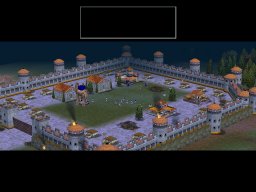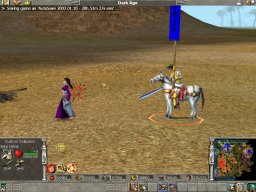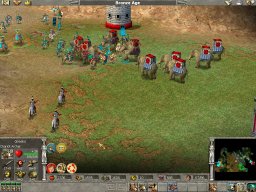 Home
News, and the latest updates.
Archives
Stories from the past...
Submit News
Got a item of interest? Here's the place to go.
Feedback
Your opinion always counts on how we can make GameSurge
even better.
Mailbag
Comments on our features, by you, the viewers. | 
Hardware
Tweaks, reviews and a handy driver index highlight our newest section
Reviews
Looking to buy one of the hottest games? We have it covered.
Previews
Get a advanced look at the games of tomorrow.
Interviews
Find out more about the people behind your favorite game.
Strategy
Need Help? We have a very large selection of walkthroughs now up.
Gallery
A special section featuring the best in artwork and
images. |

Editorials
The written word, by staff and viewers.
Game Guy
A bi-monthly column contributed by Mark H Walker, an independant writer in the Gaming community.
Gallery
Pictures from around the web.
Hosting
Our current hosting plans and features.
Site Information
Who we are, what we do, our policies and job positions.
|


PlayStation
The Sony PlayStation, and beyond...
Nintendo 64
Currently Down.
Dreamcast
The Dreamcast resource, and more. Home of the DC Technical pages. |
|
Empire Earth
Reviewed by Falcon
System Requirements:
Windows 98, Me, or 2000 CD ROM
Pentium® II - 350 MHz or higher processor
64 MB of RAM
450 MB of hard disk space; additional 100 MB of hard drive space for swap file
Super VGA monitor supporting 1024 x 768 resolution
AGP (4 MB) or PCI (8 MB) 3D video card that supports 1024 x 768, 16 bit color resolution
CD-ROM drive
Microsoft Mouse or compatible pointing device
28.8 Kbps modem (or higher recommended) for Internet or head-to-head play
DirectX compatible sound card with speakers or headphones recommended
Empire Earth is a 3D RTS game from Rick Goodman, the lead designer of the
Age of Empires series. The main feature of the game is it’s huge scope,
which spans 14 ages, known as epochs, over 500,000 years. Empire Earth
also reaches 200 years into the future, into the age of cybernetic robots,
similar to Mechwarriors. As you might imagine, the game is very similar
to the Age of Empires series. The interface is almost identical, while
the sound effects, controls and graphics are very similar, except for the
3D engine in Empire Earth.
The idea of the gameplay is the same no matter what epoch you are in,
or what sort of RTS you play for that matter – to build a base and army
while gathering resources and defending your town from enemies. What does
change over the time is the complexity of the game. From basic lands units
at the start, there is a steady increase of ground units for melee, long
range, and siege purposes, as well as naval and air units. Each unit has
a type of attack and armour characteristic that becomes interrelated with
other units.
The number of units available is among the highest of any RTS game
ever made, and there is a lot of attention to detail on strengths and weaknesses
of each unit. For example, infantry can do pierce, shock, bullet, or laser
damage, each type differently affecting other units, while tanks can do
AP, HE, or even laser damage in the future. A bomber/fighter aircraft can
do significantly more damage to an enemy fighter than against a concrete
wall. The sniper can instantly kill infantry, while AT guns can deal mortal
damage to tanks.
 Empire Earth has been designed with the strategy and history enthusiast
in mind. Not only do the campaigns relive well-known historic events, with
detailed storyline backgrounds added into each mission, but also the entire
timeline of the game features units and weapons matching those available
at each time period. Empire Earth has been designed with the strategy and history enthusiast
in mind. Not only do the campaigns relive well-known historic events, with
detailed storyline backgrounds added into each mission, but also the entire
timeline of the game features units and weapons matching those available
at each time period.
There are four campaigns, covering all the available epochs in the
game, including the ancient Greeks, middle age Europe, modern day Germany,
and futuristic Russia.
The historical accuracy of each campaign generally follows accepted
events through our civilisation’s history, except for a few alterations
here and there to fit the game. Unfortunately the accents of some of the
unique characters were quite bad, even painful to listen to, and when zoomed
in, their faces look like they were chalked onto a piece of cardboard and
pasted onto the character’s head. This was made worse by the fact that
the cutscenes during the missions use the game engine and involved zooming
into the onscreen gameplay at the current time and featuring voiceovers
for the characters.
 One good point however, is the large variety of gameplay involved in
the campaigns - rather than just being deathmatch scenarios from different
eras, all the campaigns are unique and feature different objectives and
types of gameplay to reach them. Each campaign usually follows like a story,
and upon completion of one task, the game leads you onto a new assignment.
In one Greek campaign as Athens, you have to barricade yourself in a siege
of the town, and then use a naval fleet to seek allies and collect precious
resources from each to support the besieged city. Having gained access
to (limited) resources from other cities, you will then need to build up
an army and counter attack. In Alexander the Great’s campaign through the
Middle East, you are forced with the decision to plunder valuable iron
and gold for the campaign by razing towns, or capture them and use the
citizens to farm and chop wood for you. One good point however, is the large variety of gameplay involved in
the campaigns - rather than just being deathmatch scenarios from different
eras, all the campaigns are unique and feature different objectives and
types of gameplay to reach them. Each campaign usually follows like a story,
and upon completion of one task, the game leads you onto a new assignment.
In one Greek campaign as Athens, you have to barricade yourself in a siege
of the town, and then use a naval fleet to seek allies and collect precious
resources from each to support the besieged city. Having gained access
to (limited) resources from other cities, you will then need to build up
an army and counter attack. In Alexander the Great’s campaign through the
Middle East, you are forced with the decision to plunder valuable iron
and gold for the campaign by razing towns, or capture them and use the
citizens to farm and chop wood for you.
In terms of different game types, there is nothing new; there are the
standard campaigns, or deathmatch (genocide) options. There is also the
“wonder” victory that players of AOE will be familiar with. For further
replayability, there is also a scenario editor for hardcore gamers.
There are 5 resource types, including the 4 pre-existing wood, stone,
gold and food from Age of Empires, plus a 5th - iron. One improvement from
AoE is that resource locations now have virtually unlimited amounts, so
in the span of playing up to 14 different epochs you won’t run out of resources.
Even farms have nearly limitless resources, saving the game from following
one of the most irritating parts of Age of Empires whereby a farm would
run out and the civilian will happily stand there watching grass grow.
 On the other hand it still takes a significant amount of time to gather
the resources required for units, and becomes even worse for upgrades into
modern epochs. The requirements are cumulative, so after 3-4 epoch advancements,
the cost rises to over 3000 of each resource – noting that one civilian
takes over a minute to collect just 15 of one resource and there is a 6
civilian max per mine. Therefore, although it is theoretically possible
to play a game lasting though all 500,000 years, it would literally take
days to finish the game. On the other hand it still takes a significant amount of time to gather
the resources required for units, and becomes even worse for upgrades into
modern epochs. The requirements are cumulative, so after 3-4 epoch advancements,
the cost rises to over 3000 of each resource – noting that one civilian
takes over a minute to collect just 15 of one resource and there is a 6
civilian max per mine. Therefore, although it is theoretically possible
to play a game lasting though all 500,000 years, it would literally take
days to finish the game.
Note: the requirements also vary based on the number of players in the game as well as
tournament/standard setting
In playing through the random map deathmatch scenarios, it took me
over 5 hours to complete one game against a single computer opponent which
included around 4 epoch advancements, but when I played the same map again
and entered some resource cheats it took less than 2 hours to finish. There is an added option
called tournament mode, which will speed up the gameplay slightly.

Page 1
Page 2
Page 3
|
 |
|
|
Zalman: ZM-DS4F Headphones
|
An affordable, ultra-portable headphone set.
 more more
|
|
